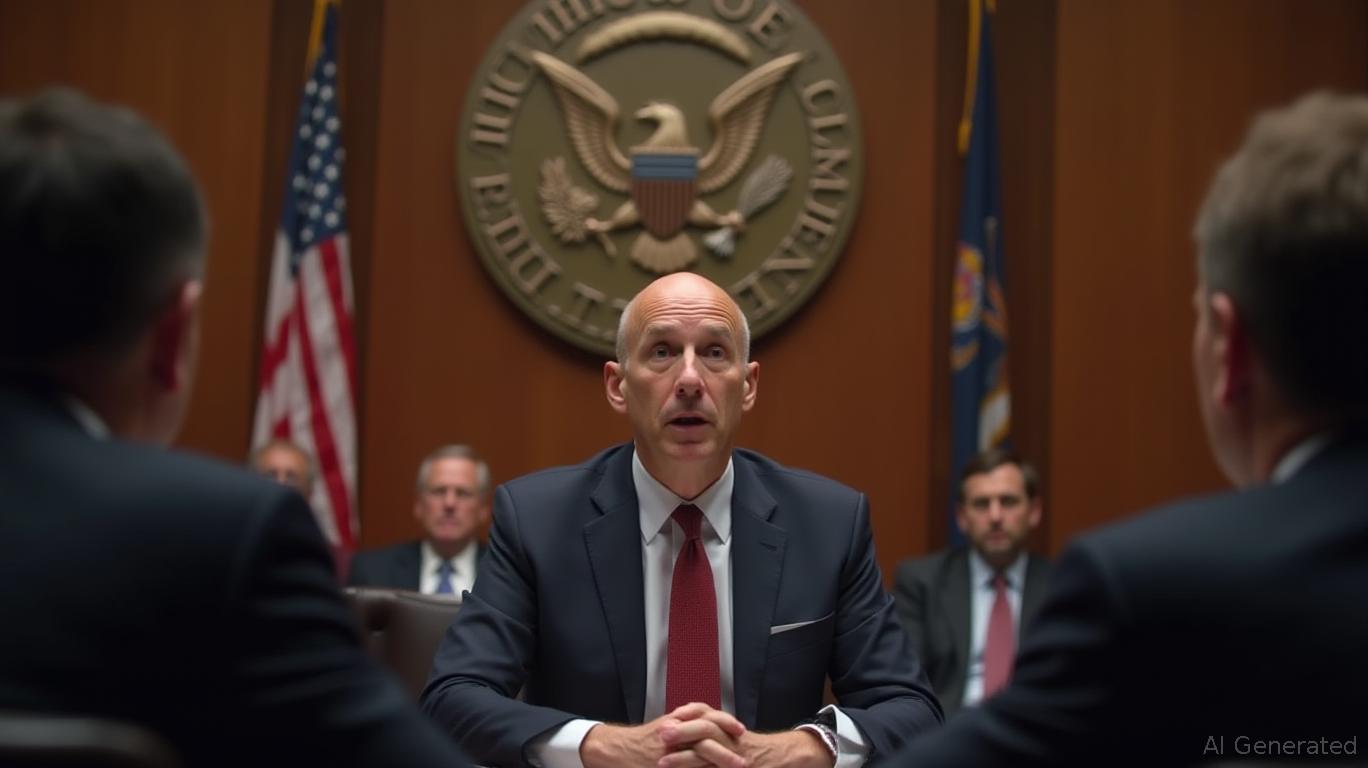SEC Adjusts Approach to Crypto Regulation: Balancing Innovation and Safeguarding Investors
- The U.S. SEC shifted from Biden-era crypto enforcement to Trump's innovation-focused policies, sparking debates over regulatory balance. - Gensler's tenure saw 125 crypto enforcement actions and a $4.5B Terraform settlement, criticized for stifling innovation with outdated frameworks. - Trump's 2025 executive order banned CBDCs and revoked SAB 121, aiming to position the U.S. as a crypto hub while facing transparency controversies. - Congressional efforts to repeal SAB 121 and SEC's IT mishap deleting Ge
The U.S. Securities and Exchange Commission (SEC) has seen a significant shift in its stance on cryptocurrency oversight, moving away from the Biden administration’s enforcement-centric tactics to a more innovation-driven approach under President Donald Trump. This change has sparked renewed discussions about the SEC’s function in the crypto industry, especially following FTX founder Sam Bankman-Fried’s assertions that the SEC under Biden specifically targeted him. In reality, the situation is more complex, reflecting broader regulatory changes rather than isolated actions.

During Gary Gensler’s tenure as chair, the SEC took a hardline stance against crypto companies, including a notable $4.5 billion settlement with Terraform Labs in 2025. This case, which revolved around the failure of the algorithmic stablecoin UST and its associated governance token
The Trump administration’s executive order on digital financial technology, issued in January 2025, marked a clear break from previous policy. By banning central bank digital currencies (CBDCs) and emphasizing the need for a national regulatory structure for digital assets, the administration signaled strong support for crypto. Acting Chair Mark Uyeda and newly appointed Chair Paul Atkins, a former SEC commissioner with significant industry connections, have since dropped several enforcement cases against companies such as
Nevertheless, the transition has not been free of controversy. A recent investigation found that the SEC’s IT department accidentally erased almost a year’s worth of text messages from Gensler’s phone due to a flawed policy, raising concerns about transparency during the Biden administration’s enforcement period. The deleted messages included conversations about crypto cases, such as the Terraform lawsuit and a significant financial services settlement, making it harder for the SEC to comply with Freedom of Information Act (FOIA) requests.
The issue of regulatory clarity has also become a point of contention in Congress. In June 2025, the House voted to overturn SAB 121, with 21 Democrats joining Republicans to oppose the policy’s effects on crypto banking. President Biden threatened to veto the measure, arguing it would weaken consumer protections, but the vote demonstrated increasing bipartisan support for a more adaptable regulatory framework. Meanwhile, the SEC’s Crypto Task Force continues to organize roundtable discussions on subjects like decentralized finance (DeFi), with Commissioner Hester Peirce stating that the agency should not regulate code-based DeFi platforms.
As the SEC faces this period of regulatory change, the crypto community remains split. While the Trump administration’s initiatives have reduced some regulatory burdens, ongoing enforcement threats and unresolved legal issues—such as how tokens are classified under the Howey Test—continue to influence the sector. At present, the SEC’s dual emphasis on fostering innovation and protecting investors points to a revised, yet still unsettled, regulatory approach to digital assets.
---
Disclaimer: The content of this article solely reflects the author's opinion and does not represent the platform in any capacity. This article is not intended to serve as a reference for making investment decisions.
You may also like
How CFTC-regulated platforms such as CleanTrade are transforming clean energy into a new category of tradable assets
- CFTC-approved CleanTrade transforms clean energy derivatives into standardized, liquid assets via its SEF platform, unlocking $16B in trading volume within two months. - By standardizing VPPAs/RECs and offering real-time analytics, CleanTrade bridges sustainability and profitability for institutional investors seeking ESG-aligned opportunities. - Early adopters like Cargill leverage CleanTrade to hedge energy costs while addressing fragmented markets, accelerating a $125T global clean energy derivatives

The Emergence of a Vibrant Clean Energy Market: How REsurety's CleanTrade Platform is Transforming Institutional Investments and ESG Approaches
- REsurety's CleanTrade platform, CFTC-approved for clean energy swaps, is transforming the market by enabling institutional trading of renewable assets with liquidity and transparency. - It addresses historical illiquidity in VPPAs/RECs through standardized contracts and real-time pricing, reducing transaction times and enabling $16B in notional value within two months. - The platform integrates ESG metrics with financial analysis, supporting 84% of institutional investors' growing demand for decarbonizat

COAI's Significant Recent Drop: Should Investors See This as a Chance to Buy or a Cautionary Signal?
- COAI's sharp stock decline sparks debate over short-term volatility vs. structural risks in South Africa's coal sector. - Weak domestic coal supply chains, US tariffs, and governance gaps amplify operational risks for export-dependent COAI. - Unclear AI policy implementation and media credibility issues deepen investor skepticism about COAI's transparency and adaptability. - Structural challenges including infrastructure bottlenecks and low AI adoption rates suggest the decline may reflect systemic indus

3 Future-Proof Cryptos to Add to Your Portfolio for 2026 — LINK, AVAX, and ALGO
